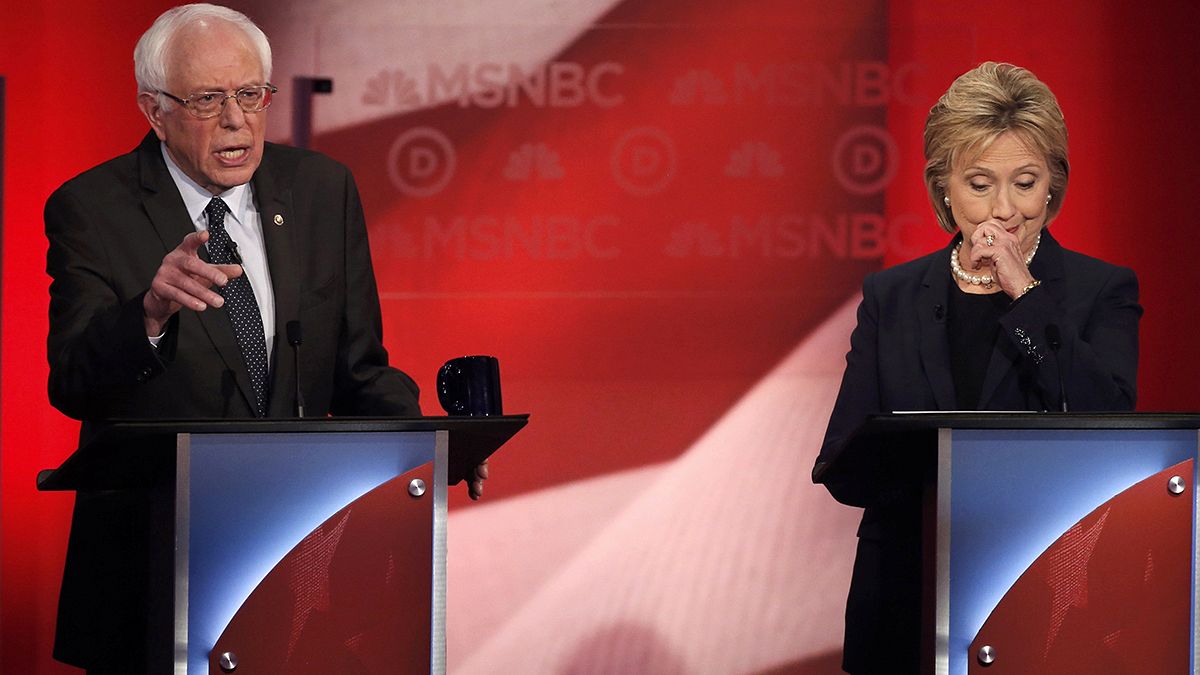For the first time, the two leading 2016 Democratic presidential candidates faced off one-on-one in what was the most thrilling debate of the campaign so far, just days before the first-in-the-nation primary in New Hampshire.
Hillary Clinton and Bernie Sanders had their sharpest and fieriest exchanges so far, clobbering each other on health care, Wall Street, foreign policy and many other issues.
The debate, slotted during the critical week between the Iowa caucuses and the New Hampshire primary, came as the candidates have been exchanging fire on who is a real progressive in the race and on who is the bigger underdog.
That battle over the label “progressive” dominated the early minutes of the debate. The moderators asked Clinton about Sanders’s charges that she did not meet the modern definition of the word.
Clinton responded by criticizing Sanders’s positions on gun laws, which have been a rare place where Sanders is not at the left edge of Congress.
“I don’t think it was particularly progressive to vote against the Brady bill five times,” Clinton said, referencing a major bill that instituted background checks for gun buyers.
“A progressive is someone who makes progress,” Clinton said. “That’s what I intend to do.”
Clinton went on the offensive by portraying Sanders as a well-meaning theorist with bombastic ideas which would never go anywhere in an era of divided government – and which would be way too expensive.
Sanders is proposing tuition-free public colleges and free health care among other things.
“The numbers just don’t add up, from what Senator Sanders has been proposing,” Clinton said.
Clinton said that her approach was more realistic. In particular, she said that Sanders’s plan for “single-payer” health care would cause a divisive and time-consuming debate which could undo the structure of President Obama’s health-care law.
Sanders replied that a number of European countries had approved single-payer health-care systems. “I do not accept the belief that the United States of America cannot do that,” Sanders said.
With a whopping 48% of the Democratic electorate in New Hampshire saying they made up their mind in the final week before the election in 2008’s Democratic primary, the stakes were high for both candidates.
Sanders, who represents neighboring Vermont in the US Senate, is leading Clinton in his backyard by 20-30 points in the polls. But Clinton, who just eked out a victory over Sanders in Iowa, remains the national Democratic front-runner by big margins.
The Clinton-Sanders race was once marked by polite disagreements about governing style. Sanders, of course, famously dismissed a damaging Clinton scandal by saying he didn’t actually care about “your damn emails.”
But as their race has tightened, both sides have turned less polite. During the debate at the University of New Hampshire, the simmering tensions between Clinton and Sanders erupted into the open.
Sanders slammed Clinton for the speaking fees Clinton accepted from large financial firms, including Goldman Sachs. To Sanders — who wants to have government break up these banks to reduce their power — the payments are proof that Clinton owes Wall Street a favor.
“Wall Street is an entity of unbelievable economic and political power, that’s a fact,” Sanders said. “I believe that corruption is rampant,” he added. “We both want to reign in the excesses of Wall Street,” said Clinton.
When the subject moved to foreign policy in the debate’s second hour, Clinton was clearly more at ease than Sanders and effectively made the case that now is not the time to put someone in the Oval Office who needs to learn on the job.
Sanders visibly struggled with foreign policy details and gave a rambling answer to a question about the future of US troops in Afghanistan, when he ended up saying he wants to fight ISIS with a big international coalition.
Time and again, he mentioned his opposition to the Iraq war and castigated Clinton’s support of the war started by the George W. Bush administration in 2003.
But Clinton was prepared for this situation and shot back: “A vote in 2002 is not a plan to defeat ISIS. We have to look at the threats we face right now.”
